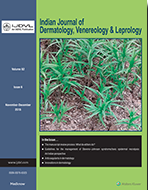 An author of a paper about a boy with a rare genetic disorder has retracted it after the patient’s family revoked permission to use his photo.
An author of a paper about a boy with a rare genetic disorder has retracted it after the patient’s family revoked permission to use his photo.
The 2012 paper in the Indian Journal of Dermatology, Venereology and Leprology (IJDVL) told the tale of a 14-year old boy with Delleman syndrome, a condition that often results in the development of cysts within the cavities of the skull, leading to malformations in the eyes, brain, and skin.
Mabel Nocito, the study’s first and corresponding author from Hospital Churruca in Buenos Aires, Argentina told us the parents initially gave permission to publish their son’s picture, but then became concerned when they realized the paper was freely accessible:
They did not understand fully what the term open access journal meant and even as the article was written in 2011, nowadays there’s a more generalized possibility of “ linking , liking and sharing” images in different social media.
According to Nocito, the parents gave oral permission to use the photo, noting:
Up until 2014 the Argentinian law allowed free publication of portrait images for scientific purposes which is no longer the case. An oral permission was enough.
He added:
I personally understand the reasons why the parents asked for the retraction therefore [its] impact on the medical community falls [into]…second place.
Nevertheless, said Nocito, he initially requested for a partial retraction, and asked the parents if there was a way around the problem by cropping or blurring the photo, but they declined.
Nocito noted:
I think that in the case of rare syndromes like Delleman, [where] case reports are the way to [find] out more about the disease, it is a setback but more and more we need to consider the patient’s rights and feelings towards their conditions.
Here’s the retraction notice for “Delleman syndrome: Report of a case in an adolescent boy:”
The article titled “Delleman syndrome: Report of a case in an adolescent boy” published in pages 229-30, issue 2, vol. 78 of the Indian Journal of Dermatology, Venereology, and Leprology [1] is being retracted. It has been reported by the author that the permission of using the images has been revoked by the family of the patient concerned. As the case involves frontal areas of face, the image cannot be modified to protect the patient identity. Therefore, in the best interest of the privacy of the patient and his family, the author has decided to retract the article.
The 2012 paper — which now contains a blacked-out version of the boy’s face — has yet to be cited, according to Clarivate Analytics’ Web of Science, formerly part of Thomson Reuters.
We reached out to IJDVL, and a journal official referred us to the journal’s publisher, Wolters Kluwer. We’ve followed up with Wolters Kluwer, and will update the post with anything else we learn.
Occasionally we see cases where papers are retracted over privacy issues — and in one previous case, patients who developed an allergy after using topical camomile pulled their consent after publication. More recently, a journal removed a paper after learning that the authors had used a quote from an HIV-positive patient on a social networking site that contained enough information to reveal his or her identity.
Like Retraction Watch? Consider making a tax-deductible contribution to support our growth. You can also follow us on Twitter, like us on Facebook, add us to your RSS reader, sign up on our homepage for an emailevery time there’s a new post, or subscribe to our daily digest. Click here to review our Comments Policy. For a sneak peek at what we’re working on, click here.
I’m kind of stunned that the authors wouldn’t have anonymized the photographs in the first place. Do what’s right from the start and you don’t have to go through the trouble of correcting things in the future.
As the retraction notice indicates “As the case involves frontal areas of face, the image cannot be modified to protect the patient identity”.
The problem is that Delleman Syndrome affects your head, both the brain but also the face particularly the eyes. So if you want to include a picture showing the results of Delleman Syndrome you cannot anonymize the photographs because that would obscure exactly the areas affected by the condition.